It’s never been more important to know how to start an online business.
Getting it right means having location independence, security in global crises, and financial freedom.
But knowing how to plan, execute and market a successful business isn’t easy–if it were, everyone would do it. Preparation and the right steps are essential to succeeding in a competitive online space.
Let’s look at everything you need to do to start an online business and everything you need to avoid.
The Easy Parts of Starting An Online Business
There are so many resources to help you start an online business these days that even the hard parts can be easier.
Something like setting up the tech and backend, for instance, can be done in a day. It’s easy to set up your branding, website, and social media with the help of software services or freelancers.
Even the legal side of setting up a business can be easy. Online legal services specialize in online companies, and help you draw up and file the necessary documents, register your business, and offer legal advice.
One of the best companies for this is Rocket Lawyer. It offers a range of services, including documents, consultations, business incorporations, and legal policies. This can be especially useful if you don’t have a huge budget for starting your online business.
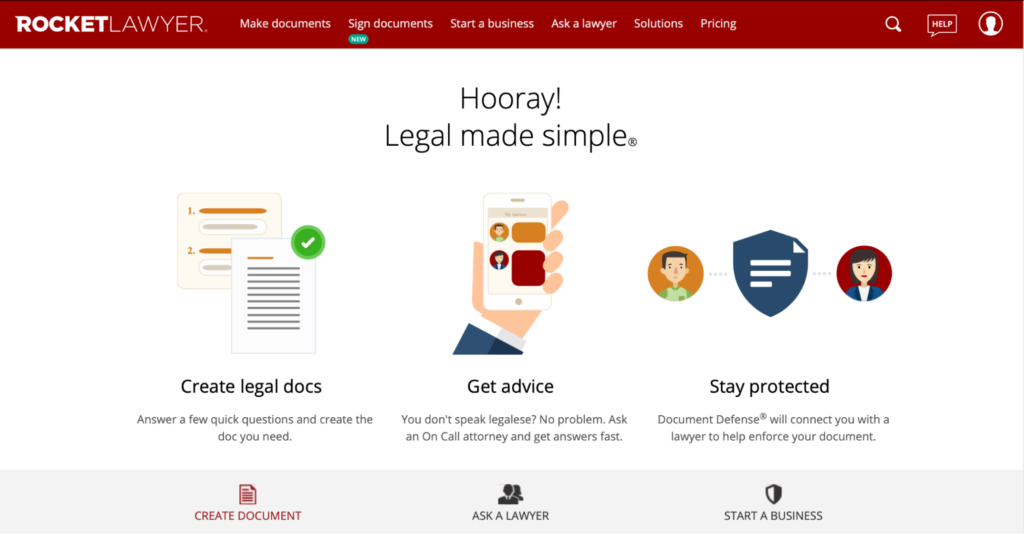
The Difficult Parts of Starting An Online Business
Setting up an online business can be easy–but building a successful one isn’t.
That’s why actually marketing and running an online business is where most people struggle. Knowing how and where to promote your business to generate sales can be challenging, and you can never plan for everything when it comes to customers.
Other challenges include cybersecurity to keep your site and customer’s information secure, order fulfillment and logistic issues, and truly understanding your niche and customers.
That’s why it’s so important to have a plan and get the easy parts right.
Here are the steps you should take if you want to start a successful online business:
Step 1: Get Organized
Before you launch your business, you need to do the prep work. How will you market your brand? Where does your target market shop? What are your goals moving forward?
It’s essential to spend some time planning out different parts of your business to avoid getting overwhelmed later on.
Let’s break down some of the things you’ll need to organize before your launch.
Decide What Your Business Will Do
The first thing you need to organize is what you’re business will actually do.
Are you going to open an online ecommerce store? Are you going to start a graphic design company? What kind of business you have affects which software you use, how much investment you need to make, and how you market yourself to the world.
Here are some things you need to get clear on for your business:
- What you’re offering customers
- Who your target audience is
- What your business model looks like
- What niche your business is in
- How you will set your business apart from the competition
Do Market Research
The online business space is pretty competitive. To be successful, you need to make sure you give your audience something they want and need.
That’s why doing market research is so important. Not just for you to use when you do your marketing but also to make sure you have a unique selling point.
Get some information on what customers want by looking at:
- Competitors
- Google Trends
- Common Search Terms and Keywords
- Forums and Online Discussions
- Social Media
- Business Publications
- Survey Results
Choose Your Business Name
Having a business name is important for setting up a website domain, social media accounts, and registering your business.
Your name should be easy to say, relevant to your niche and product, and memorable. This will become a vital part of your brand, so take it seriously and take your time choosing the right name.
Set Up Your Branding
Even if your product or service is unique, you still need to work on memorable branding. To become successful, you need to be recognizable and appealing to your target audience.
Remember to always have them in mind when working on your business.
Branding includes things like your logo, colors, fonts, and business name. Altogether, it is the voice and presentation you use across all your written copy (website, social media, advertisements, etc.).
If you want to see a great example of the power of branding, look no further than Coca-Cola:

The font and red color are unmistakable–and due to clever branding, Coca-Cola is the second most recognized word in the world.
If you’re a little lost with your branding, you can always outsource to graphic designers and copywriters. You can also check out our guide on building a memorable brand.
Create A Business Plan
Once your business is in full swing, it’s easy to get overwhelmed.
Having a written business plan keeps you focused, moving toward your goals, and increases your chances of success by 16%. It also helps you keep things clear and makes it easier to collaborate with partners or investors down the line.
Your business plan should include things like:
- An executive summary
- A company description
- Market research
- A description of products and/or services
- Your management and operational structure
- Your marketing and sales strategy
- Your financial plan (including your capital and investors) and goals
Having a business plan is especially important if you’re working with vendors or with a team. The business plan helps keep everyone on the same page and avoids any misunderstandings.
If you want help putting together a business plan, you can work with a consultant or check out our guide.
Step 2: Get Legal
It’s easy to get caught up in the excitement of branding and setting goals, but the legal side of your business should be a top priority.
Getting all of the correct legal procedures organized at the start will give you peace of mind and save you trouble later on. It’s crucial to do all of this before you launch to protect yourself and your customers.
Most of the legal aspects of starting a business should be done through an attorney. However, some great third-party services can help you with all the legal aspects of your business (for a much lower fee). As mentioned, we recommend RocketLawyer due to its speedy services. You can access attorneys for legal advice, business formation services, business plan help, document processing, estate planning, and more.
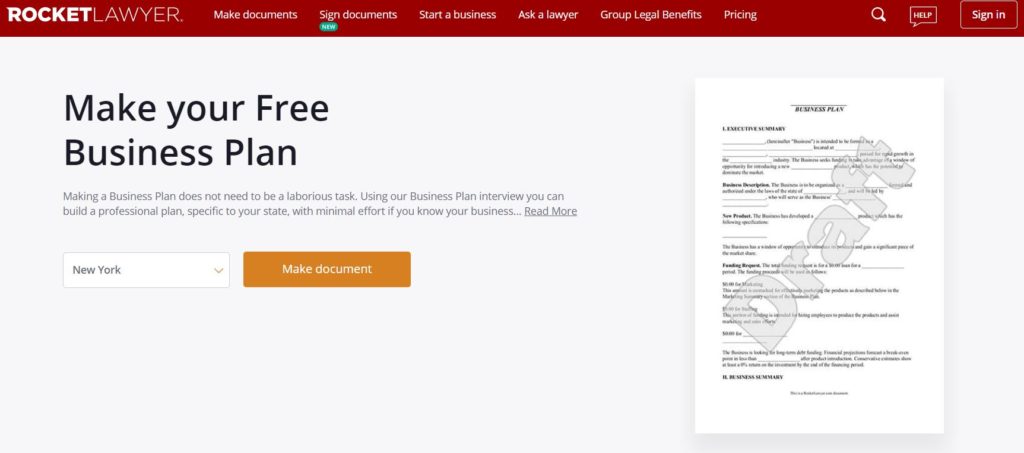
If you want to do it yourself, below are some of the main things you’ll need to do to legalize your online business.
Draft The Legal Pages For Your Website
You’ll need a website for your online business, and websites are required by law to have certain pages.
These include things like:
- A privacy policy
- Terms and conditions
- Disclaimers
- Disclosures
- Refund policies
These pages are there to protect both you and your customers, and you won’t be able to operate an online business without them, even if you’re a solopreneur who just sells services.
If you look at any site, you’ll see that they have legal pages like their privacy policy marked in their footer:
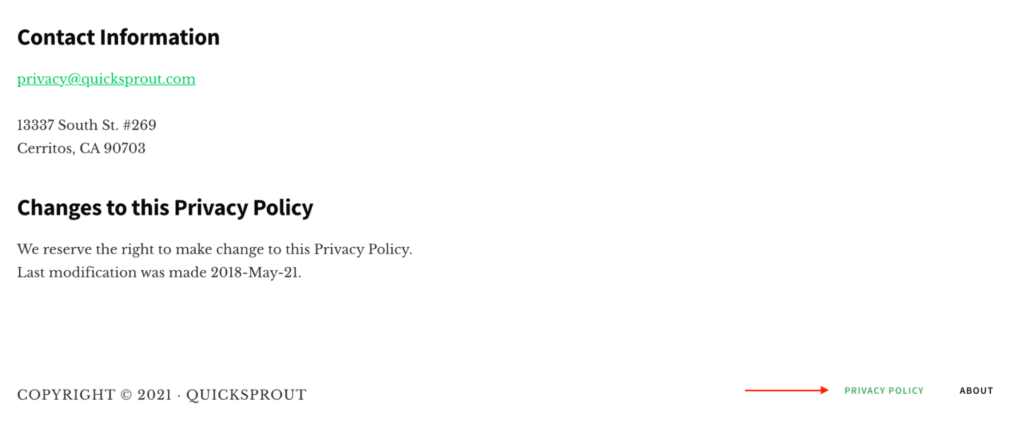
You should look for a lawyer specializing in online businesses to help you draft pages that work with your specific needs.
Draw Up Contracts
If you are working with anyone else in your business, you’ll need to draw up contracts. This includes partners and co-owners, merchants, consultants or contractors, and employees.
As with all legal documents, it’s best to consult a lawyer to make sure you’ve done everything you need to.
Or use Rocket Lawyer to draw up business contracts, legal pages for websites, and LLC operating agreements.
They also have qualified attorneys available to consult, so if you need any help legalizing your business, you can go to them for answers. It’s a great way to cut the costs of working with lawyers while still getting legally binding contracts and documents.
Secure Licenses
Depending on your business model and location, you may need licenses to start an online business.
In some states, you might be required to have a seller’s permit or an occupational license. The licenses you need will ultimately depend on what your business does and where you live, but it’s important to research this before your launch.
If you’re unsure, you can always contact your city government or a local lawyer for advice.
Register Your Business
To set up an online business, you’ll need to register with your local government. Whether self-employed or a corporation, it’s vital because it provides you with a business registration number and a business tax number.
How and when you need to do this will depend on your state, so speak to a lawyer or government representative to ensure you’re following the law.
Get An Accountant
One of the main reasons you need to register your business with your government is to get a business tax number. Even if you’re a sole owner, keeping your business expenses separate from your personal ones is a good idea.
It’s highly advisable to work with an accountant from the start of your business. Having an accountant will significantly reduce your stress, especially around tax time.
Consider using accounting software if you want to make tax time even easier for yourself and your accountant. We’ve reviewed the top accounting software options for small businesses to help you choose the right one for your business.
Step 3: Get Your Business Set Up
Once you’ve got a solid business plan and the admin out of the way, it’s time to get your business set up.
With an online business, this means organizing the technology and the actual product. With this step, you get to implement your branding and create your business presence. The aim here is to reduce the number of things you have to worry about later, so you can focus on sales instead.
It’s important to set yourself up for success with your online presence and putting together your products or services.
Here’s what you’ll need to do pre-launch:
Create Your Products or Source Them
Now that you have a businesses plan, you need to put together the actual product.
If it is a digital product like a course or a service like graphic design, it’s time to create your online course or put together your portfolio and list of services.
If you’re starting an ecommerce business, this is where you order your stock and get your items ready to sell.
Create Your Website
Whether you’re selling services, a course, or physical products, you’ll need a website.
There are plenty of great companies to choose from when it comes to hosting and themes–and each one includes templates, so you don’t need to be a coding expert. Most hosting sites will also offer you a free domain, so it’s worth looking into different plans to see which one best fits your budget.
Start with a web hosting company like Bluehost and then choose a theme. Most platforms or themes come with templates to help you design an attractive site that fits your business and brand.
If you’re starting an online store, you can cut out the middle man with an ecommerce platform like Shopify. It’s specifically designed for online stores, so they’re already optimized for ecommerce, and you can choose from a wide range of great themes to fit any style.
If you want help creating a really professional website, you can also hire a web designer for this step. Or you can read our step-by-step guide on creating your own website.

Launch Your Social Media
Social Media is the best marketing tool you’ll find for an online business. It’s cost-effective, has a vast reach, and allows you to interact directly with potential customers.
Focus on setting up social media accounts on platforms where your market audience is most active. Keep your branding consistent across all accounts, including the voice of each of your posts.
You can hire a social media manager for this step to help you optimize your socials, or read our guide about marketing your business on social media.
Step 4: Marketing
Now that you’re ready to launch your business, it’s time to focus on marketing.
Marketing will determine how successful you are.
You can have the best product in the world, but it’s pointless if no one knows how to find it. You need to make sure that people know about your business and why your business is the best.
Here are some of the most powerful ways you can market your new business:
Advertising
If you’ve set aside a budget for advertising, now’s the time to use it.
You can pay for ads to appear on social media like Facebook, Instagram, and Pinterest.
You can also pay to have ads displayed on search engines like Google or Bing:
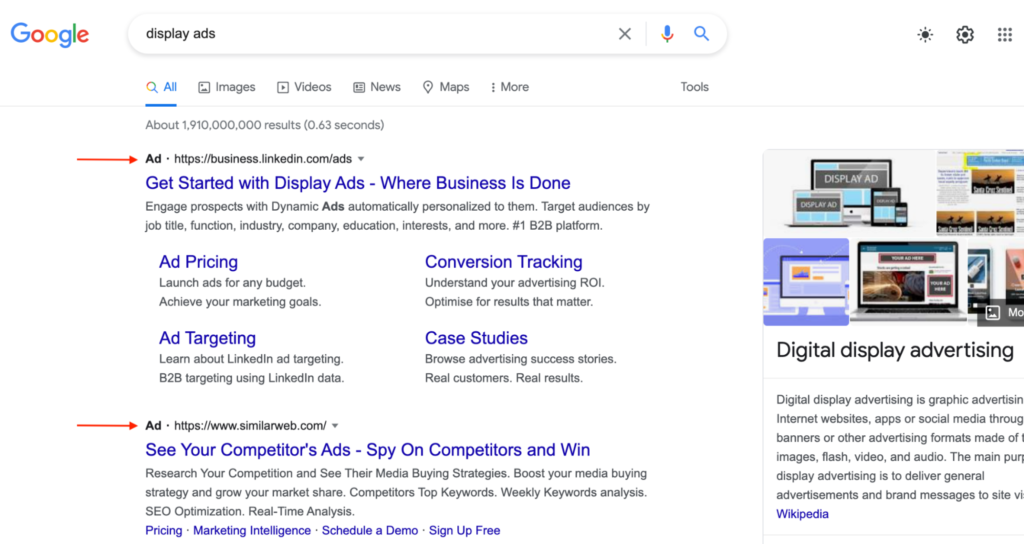
Content Marketing
Content marketing includes things like blog posts, videos, and podcasts. It builds trust and a connection with your audience, and it’s so powerful that 70% of marketers actively invest in it.
Unless you’re great at writing or dream of having your own podcast, this is something you might want to outsource to a marketing agency or freelancers. It’s extremely valuable but time-consuming, so if you want to scale quickly, factor that in.
Content marketing is also a great way to implement SEO best practices and rank higher in the search engine results pages (SERPs).
Influencer marketing
Influencer marketing is the fastest-growing form of marketing in today’s business world. A report from Influencer Marketing Hub valued it to be worth $13.8 billion this year.
Offering your service or product to high-profile social media users for free or in exchange for a review is a cheap but powerful way to get your brand noticed.
Outsourcing
If you don’t have time to do your marketing, you can outsource to a marketing consultant, freelancer, or agency.
They’ll take care of your advertisements and content, as well as things like email marketing and social media marketing. If you’ve put aside money for advertising, this is a great way to get value without doing all the work yourself.
Step 5: Run Your Business
Once you’ve launched and promoted your business, it’s time to run it.
This can be the most challenging part because working with clients is unpredictable and something you can’t plan for. It’s important to be ready for the ups and downs, keep a clear head, and stick to your business plan.
There are a few things, however, that you can do to improve your chances of success.
Invest In Customer Service
Customer service is usually the first thing business owners outsource or delegate, as it can be time-consuming and unpleasant.
But good customer service is essential to success. According to Microsoft, 90% of Americans use customer service as a major deciding factor when choosing where to spend their money.
For instance, Hollister was voted one of the best brands in America for customer service in 2021. And its parent company, Abercrombie and Fitch, has had massive success so far this year:

You can also make this task easier by automating or streamlining your customer service using the software. Check out our guide for the best tools you can use for happy customers.
Use Emails To Your Advantage
You can use emails to promote and sell your services, and you can also use them to retain a loyal customer base.
Emails are one of the easiest things to automate, and they’re highly effective in making customers feel valued, upselling them, and doing market research.
You can use your email list to send customer promotions, updates, and news, but you can also use it to send them surveys. This means you have an accurate source for future market research to help you run a smoother and more valuable business.
Keep Updating Your Business
One of the challenges of running an online business is that the online world changes fast and all the time. If you want to stay successful, you also have to be constantly evolving.
To keep up with your competition and your customers, you need to keep your business updated.
This includes updating:
- Products, images, courses, and services
- Tech like your website
- Social media with new content
- Goals and strategies as you grow
Step 6: Scale Your Business
If you’ve followed all the steps on the list and found success, you may be struggling to keep up with your growth.
You can now think about scaling your business and expanding it so that you don’t have to miss out on more income.
Let’s look at some of the most effective ways you can scale your business.
Hire Employees
Once you start having too many tasks to handle, it’s time to hire employees or contractors. This can be for jobs you don’t have time to do, things you don’t want to do, or for any overflow of work.
Depending on your business model, you might want to outsource some of your tasks to contractors, or you might want to hire full-time employees to help you deliver goods.
Outsource Projects
Similarly to hiring, you can consider outsourcing the tasks you hate or don’t have time for to freelancers or agencies. You could outsource your content marketing to an agency, for instance, or your customer service to a virtual assistant.
You can check out sites like Fiverr or Upwork to find freelancers:
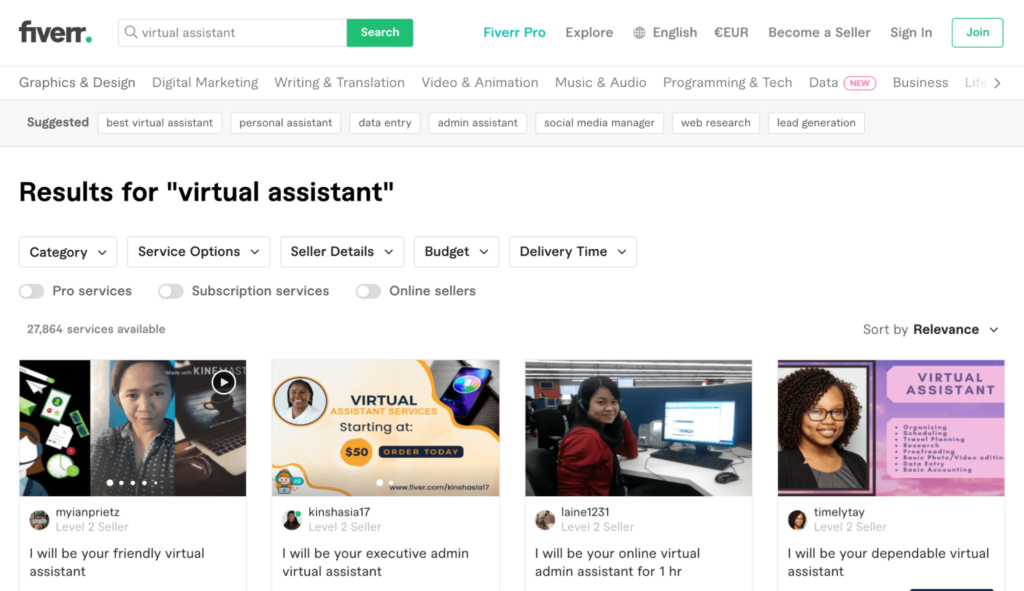
Expand Your Business
If your business has gotten to the point that you can become international or offer a broader range of projects, it’s time to expand.
You’ll want to follow the above steps to do this, and then you need to budget your financials to buy more stock, create more products, or offer more services. Make sure that you stay within your budget and update your business plan with new goals and financials.
